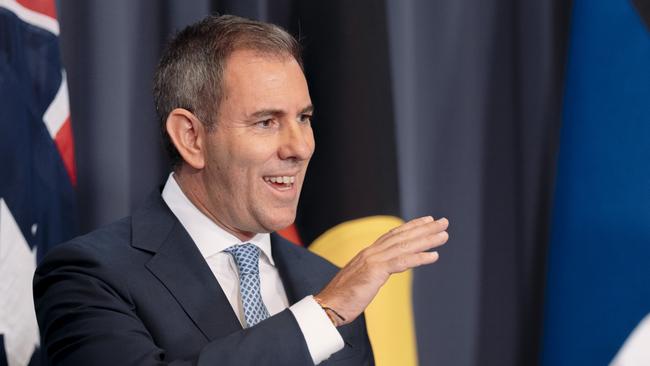‘Unfinished business’: Jim Chalmers to push ahead with superannuation tax hike as concessions hit $55bn
Superannuation tax concessions are expected to cost the federal budget more than $55bn this financial year, as Jim Chalmers vows to push ahead and legislate Labor’s tax hike on high-balance nest eggs.

Superannuation tax concessions are expected to total more than $55bn this financial year, as Jim Chalmers vows to push ahead with “unfinished business” and legislate Labor’s tax increase on high-balance nest eggs.
Treasury’s annual estimate of the cost of the nation’s tax breaks also projects investment property tax concessions at $26.5bn, after the Treasurer in September flirted with and then abandoned reforms to negative gearing and the capital gains tax discount.
The 48 tax concessions reviewed by Treasury in its Tax Expenditures and Insights Statement are estimated to cost the federal budget $219.8bn in forgone revenue for the current financial year.
But even as Wednesday’s mid-year budget update will show an additional $25.1bn in government spending and shrinking revenues, including a downward revision in the company tax take, Dr Chalmers said Labor was not preparing to tighten tax concessions.
“It’s an important piece of analysis; it’s not a statement of policy intent,” Dr Chalmers told reporters, instead vowing to progress Labor’s existing tax reform agenda which included making super concessions “fair and more affordable”.
“That’s our focus rather than new elements of an agenda on that front,” he said.
“The combination of spending restraint elsewhere, finding all of those savings, (and) some modest but meaningful tax reform means that we can pay for these priorities.”
Dr Chalmers rejected suggestions he had deliberately released the tax statement in December – a month earlier than usual – in order to spark a pre-election policy debate about the cost of concessions, including negative gearing.
“It’s important not to be cynical about it. What we’re doing here is it’s ready to go and when it’s ready to go, I like to get it out the door,” he said.
Concessions on superannuation earnings and contributions are forecast by Treasury to cost the federal budget $55.2bn in 2024-25, comprising $31bn in contribution concessions and $24.2bn in earnings offsets, with the latter targeted by Labor.
That overall revenue hit from the retirement tax breaks is significantly higher than Treasury’s projection of $41bn three years ago.
However, the government’s proposal to hike the tax rate on high-balance superannuation accounts – one of its few planned revenue-raising measures – remains stalled in the Senate and is unlikely to pass the parliament before the election.
If passed, the changes would double the tax rate on earnings of superannuation accounts worth more than $3m from 15 per cent to 30 per cent.
The measure is slated to take effect from July 2025 and is projected to raise $2.3bn in 2027-28 once it fully takes effect.
Earnings on balances worth less than $3m will continue to be taxed at a 15 per cent rate.
The changes, however, are yet to be passed following opposition from the Greens, which have demanded the threshold be lowered to $2m, while key Senate crossbenchers have argued the measure should not apply to unrealised gains.
Amid an expected narrowing of the income tax base as society ages, analysis conducted by Treasury in its expenditure statement showed tax concessions on superannuation earnings disproportionately benefited the wealthy.
In 2021-22, people with above-median incomes received 83 per cent of the benefit from the concession, with those in the top 10 per cent of taxable incomes receiving 43 per cent of the benefit.
“People in higher taxable income deciles received a larger share of the benefit due to having larger superannuation balances and paying higher marginal tax rates, which made the flat rate of tax on superannuation earnings more concessional,” the statement said.
The benefit from super earnings tax concessions was highest for people aged 55 to 69, reflecting their higher incomes and longer accumulation periods.
In its latest health check on the Australian economy, the International Monetary Fund supported Labor’s superannuation changes.
“The policy is in the right direction,” the IMF said in January.




To join the conversation, please log in. Don't have an account? Register
Join the conversation, you are commenting as Logout